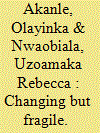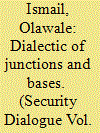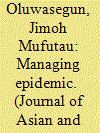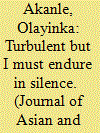|
|
|
Sort Order |
|
|
|
Items / Page
|
|
|
|
|
|
|
| Srl | Item |
| 1 |
ID:
173786


|
|
|
|
|
| Summary/Abstract |
Even though the phenomenon of female family support may not be entirely new in Africa, breadwinning is the primary role of men in most African societies. However, as more women get education and enter paid employment, and some men lose jobs, traditional breadwinning roles are challenged and, sometimes, inverted as growing numbers of women become family breadwinners. Female breadwinning may not be without implications for family stability, however, as it confronts instituted normative gender order in patriarchal societies. While female breadwinners are increasingly common in industrialized societies, and literature exists on their trajectories in such contexts, more recent works are needed in Africa, particularly Nigeria. This article, therefore, examines the nexus of female breadwinning and family stability in Nigeria. This article is an important one on a growing phenomenon in Africa resulting from urbanization, industrialization and economic crises in certain regions of the continent. Guided by modernization and patriarchy theories, the study relied on qualitative method of data collection. Twenty in-depth interviews (IDIs) were conducted in contexts of female breadwinning families. Data were analysed and presented as interpretive narratives. An interesting relationship was found between female breadwinning and family stability in the setting. Generational influences and associated outcomes were also found and presented in this article.
|
|
|
|
|
|
|
|
|
|
|
|
|
|
|
|
| 2 |
ID:
092062


|
|
|
|
|
| Publication |
2009.
|
| Summary/Abstract |
This article examines the involvement of youth - constructed as 'area boys' and 'area girls' - in crises of order in downtown Lagos. It explores the emergence of 'bases' and 'junctions' as modes of organization and differentiation between and among youth in urban Lagos. A 'base' is a neighbourhood meeting place where youths gather to relax, recreate, and discuss sports and politics. A 'junction' is where social miscreants, street marauders and touts congregate to exploit money-making opportunities. It is my argument that bases and junctions embody distinct, yet connected, forms of subcultures that are simultaneously imbibed and projected by members. Moreover, they constitute emergent forms of territoriality constructed around spaces of leisure, residence and commerce, manifested in extrastate regimes of (dis)order in downtown Lagos. The article unpacks the involvement of members of junctions and bases in the provision of (dis)order as 'securo-commerce' - payment of different kinds of fees and levies to purchase security or forestall insecurity in downtown Lagos.
|
|
|
|
|
|
|
|
|
|
|
|
|
|
|
|
| 3 |
ID:
115835


|
|
|
|
|
| Publication |
2012.
|
| Summary/Abstract |
Streets are sites of hegemony and counter-hegemony, of inclusion and exclusion, of incorporation and expulsion, and of cooperation or conflict. Thus, in the cultural geography of cities, commemorative street names are critical sites of social reproduction. Commemorative street naming is both an historical referent as well as a spatial designation. Recent literature on toponymy calls attention to such practices as important cultural and political arenas for understanding socio-political processes, but often focuses on the politics and sociality of street naming within local, national politics to the exclusion of how local politics intersects with international politics. This article examines the politics of spatial inscription and the social reproduction of 'place' or 'space' on a street corner in New York City named after Kudirat Abiola, an assassinated woman activist in Nigeria, and the retaliatory renaming by the military regime of a Lagos street hosting the US Embassy after the African American anti-establishment activist Louis Farrakhan. Subsequently, the next democratic government of Nigeria renamed the street, this time after the US ambassador, the African American Walter Carrington. Toponymy, the article concludes, can thus be seen as a form of retortion in international relations.
|
|
|
|
|
|
|
|
|
|
|
|
|
|
|
|
| 4 |
ID:
157862


|
|
|
|
|
| Summary/Abstract |
This article draws on in-depth fieldwork in Lagos, Nigeria, to explain the changing role of motor-park touts (agberos) in urban transport. Situating the emergence of agberos within the insecurity and radical uncertainty caused by the structural adjustment programme of the 1980s, this article explains the transformation of agberos in the light of their tacit incorporation into the National Union of Road Transport Workers, which politicized and altered their role in urban transport. It further argues that current efforts to rid motor-parks of agberos is inspired by the post-1999 urban renewal project of the Lagos State Government to transform Lagos into a ‘world class’ megacity. Yet, the embedded role of ‘big politics’ (i.e. the strategic alliance between the union and the state) helps to explain the difficulty of doing away with agberos in Lagos. By focusing on their changing role in Lagos, this article foregrounds the critical and mediating role of agberos in the day-to-day management of urban public transport, while illuminating the politics of violent patronage and extortion rackets in which they are popularly implicated.
|
|
|
|
|
|
|
|
|
|
|
|
|
|
|
|
| 5 |
ID:
180262


|
|
|
|
|
| Summary/Abstract |
Rather than examining what constitutes urban life in a particular city, this paper draws attention to how cities are ‘placed’ along individuals’ life trajectories. The outcome of 15 months of ethnographic research among 102 residents of Lagos's Gowon Estate neighbourhood suggests that Lagos is better understood relationally, through subjective narratives of city life. Given its scale and position among Nigerian cities, the meanings of Lagos to different individuals must be illuminated via an examination of how they ‘place’ those urban places that are important to them – Lagos, hometowns and regional centres – both conceptually and practically within their lived experiences and current livelihoods. In short, this paper exemplifies and advocates a methodology that does not treat cities as a central analytical unit, but instead interprets the meanings of living in cities based on individual inhabitants’ narratives, networks and other aspects of their lived experiences in Lagos and elsewhere.
|
|
|
|
|
|
|
|
|
|
|
|
|
|
|
|
| 6 |
ID:
153099


|
|
|
|
|
| Summary/Abstract |
This paper examines how the British managed the 1918–1919 influenza epidemic in Lagos, the reactions of the local population to new sanitary and medical policies enforced during the period, and its social and political implications for future epidemic management in the colony. Unlike several studies which approach the history of the pandemic from global and national perspectives, a focus on Lagos, the colonial capital of Nigeria, one of Britain’s most important colonies provides this paper with a rare opportunity to engage with how local peculiarities informed decisions about the resolution of a global problem. Lagos is chosen as the terrain for discussion because of the ample data generated about it in the course of the 19th and 20th centuries (not just between European missionaries and the indigenous Lagosians, but also for other influential cultural and ethnic groups such as the Saro and Amaro (migrants from Brazil), and the Indian influence on medical policies in Lagos).
|
|
|
|
|
|
|
|
|
|
|
|
|
|
|
|
| 7 |
ID:
171446


|
|
|
|
|
| Summary/Abstract |
Property rights are important for economic exchange, but in many parts of the world, they are not publicly guaranteed. Private market associations can fill this gap by providing an institutional structure to enforce agreements, but with this power comes the ability to extort from group members. Under what circumstances do private associations provide a stable environment for economic activity? The author uses survey data collected from 1,179 randomly sampled traders across 199 markets in Lagos, Nigeria, and finds that markets maintain institutions to support trade not in the absence of government, but rather in response to active government interference. The author argues that associations develop protrade policies when threatened by politicians they perceive to be predatory and when the organizations can respond with threats of their own. The latter is easier when traders are not competing with one another. To maintain this balance of power, an association will not extort; it needs trader support to maintain the credibility of its threats to mobilize against predatory politicians.
|
|
|
|
|
|
|
|
|
|
|
|
|
|
|
|
| 8 |
ID:
157769


|
|
|
|
|
| Summary/Abstract |
As Africa’s urban systems change and transform with more women becoming educated and getting work outside the home and more men are confronting unemployment and retrenchment, an emerging phenomenon has surfaced challenging common gender identities and roles in the context of families. Current livelihood realities reconstruct and renegotiate how household needs are met and who meets these needs, consequently questioning traditional patriarchal dictates. Increasing numbers of women in Africa’s urban centres play breadwinning roles and become lifelines for their families. Unfortunately, research and literature say little about the experiences of these women as they navigate unusual social spaces. This article investigates the challenges that breadwinning women face and how they cope with these challenges in a Nigerian megacity. Data were gathered through In-depth Interviews (IDIs) with 20 female breadwinning families and the theoretical framework adopted is a triangulation of modernisation and patriarchy theories. Data analysis was done through content analysis and presented as ethnographic narratives and summaries. Important findings were made and presented in this article.
|
|
|
|
|
|
|
|
|
|
|
|
|
|
|
|
|
|
|
|
|